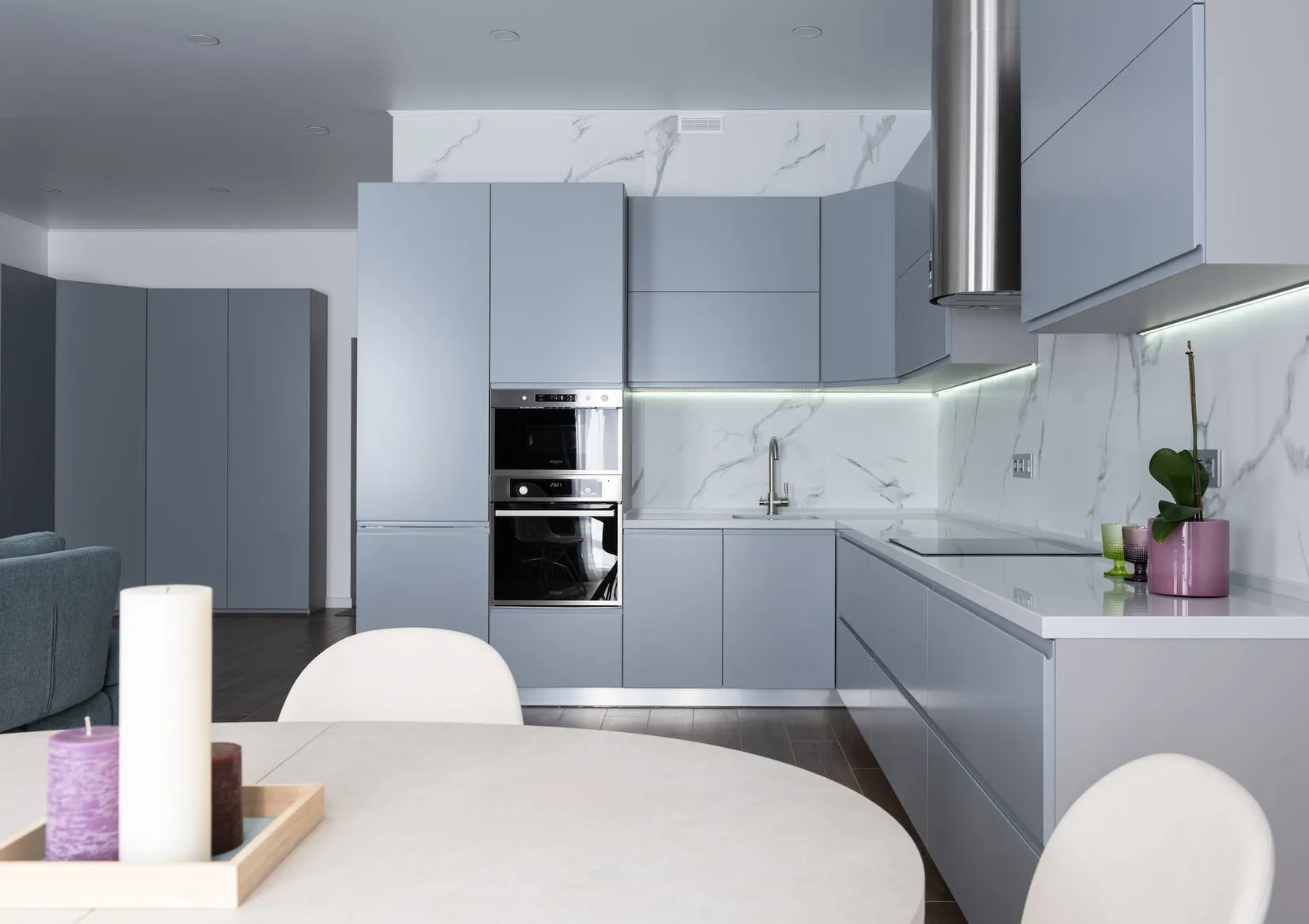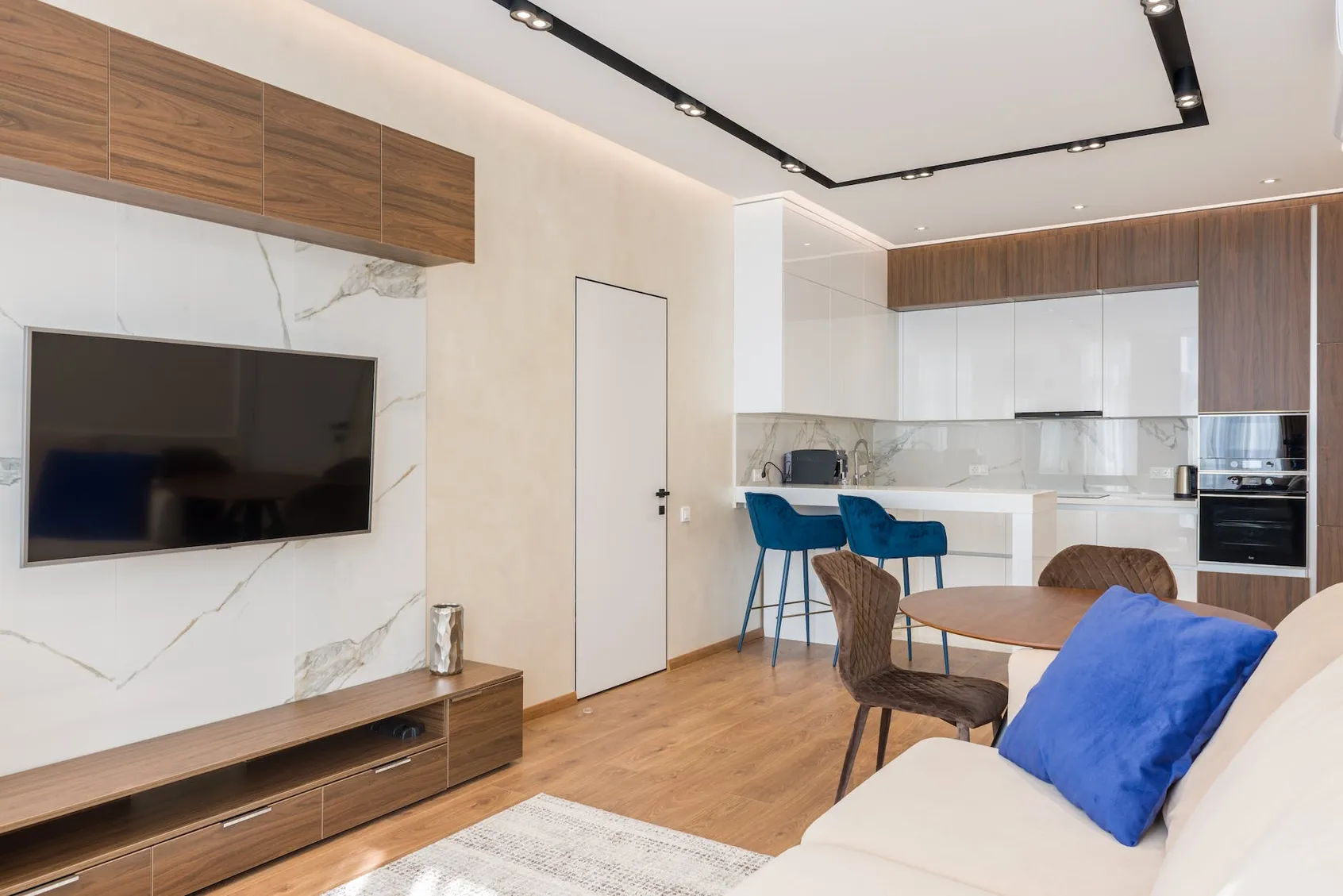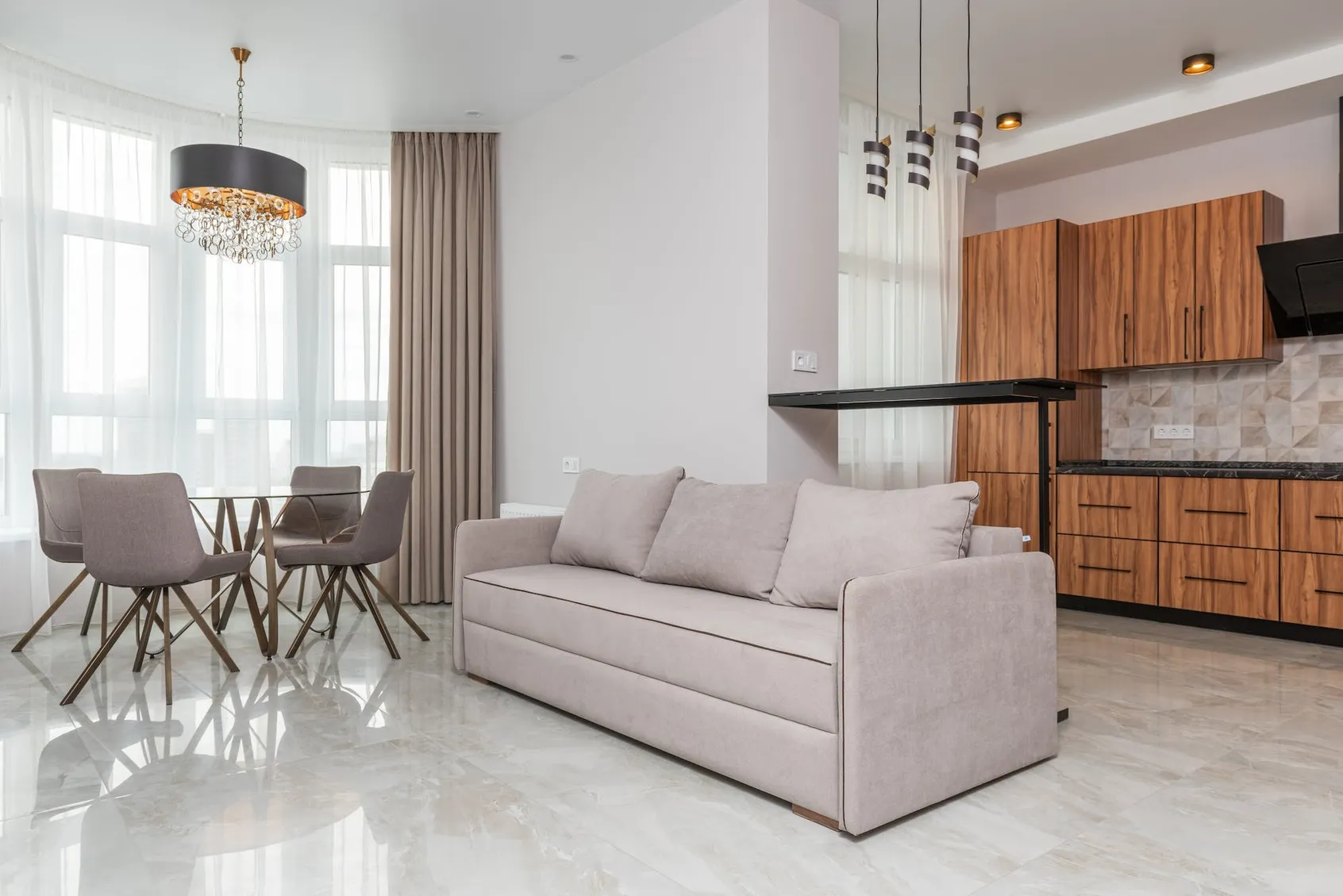Finding an apartment with no kitchen can be challenging, especially if you’ve been used to living in a fully functional kitchen. But it can be done.
In this article, we’ll cover some important things about renting an apartment without a kitchen, such as the types of places that offer this option, the cost, and how to stay organized without a kitchen.
By the time you finish this article, you should better understand what to expect when renting an apartment without a kitchen.
Finding An Apartment With No Kitchen
Finding an apartment without a kitchen can be an intimidating task. It is important to understand the restrictions and laws of living in an apartment without a kitchen and know the potential challenges. When looking for an apartment without a kitchen, it is important to consider the costs associated with the unit, the amenities available, the location, and the overall living experience.
First and foremost, it is important to consider the costs associated with an apartment without a kitchen. Only apartments with kitchens come with additional fees and restrictions. Understanding these fees and weighing the costs against the savings of not having a kitchen is important.
For example, many apartments without a kitchen will require renters to pay for laundry facilities and/or a shared kitchen. Additionally, living in an apartment without a kitchen often means the tenant must purchase their cooking supplies and appliances.
In addition to the costs associated with an apartment without a kitchen, it is important to consider the amenities available. Depending on the specific apartment building, a range of amenities may be available to renters. It is important to check whether the apartment building has a gym, swimming pool, or other recreational facilities. It is also important to check if the building offers additional services such as laundry, internet, or television.
Location is also important when searching for an apartment without a kitchen. Considering the proximity to work, shopping, and other necessary amenities is important. Additionally, it is important to consider the safety of the neighborhood. The last thing anyone wants is to live in an unsafe area.
Finally, it is important to consider the overall living experience when looking for an apartment without a kitchen. It is important to consider the size of the apartment, the amount of privacy offered, and the overall atmosphere of the building. Additionally, it is important to consider the amount of noise from neighbors and other tenants.

Understanding The Legal Requirements For Non-Kitchen Apartments
Finding an apartment without a kitchen can be daunting, as many cities and states have specific regulations governing the minimum requirements for an apartment to be considered livable. Knowing these legal requirements is important to ensure that you are not breaking any laws and that your living space is safe and comfortable.
The first step in understanding the legal requirements for a non-kitchen apartment is to familiarize yourself with local zoning laws. Different cities and states may have different zoning laws that dictate the type of apartment allowed in each area. Check your city’s zoning laws to ensure that a non-kitchen apartment is allowed in your area.
In addition to zoning laws, it’s important to understand your state or city’s health and safety codes. Your apartment should meet the same standards for safety as any other living space, such as having functioning smoke detectors and other safety features.
Additionally, if you plan to have any appliances in your non-kitchen apartment, such as a refrigerator or microwave, check your local regulations to ensure they are up to code.
Finally, it’s important to understand the landlord-tenant laws in your area. These laws will dictate the rights and responsibilities of both parties, such as the length of the lease and the tenant’s rights to privacy. Make sure to familiarize yourself with your local laws to ensure that you are entering into a legal and fair agreement when renting a non-kitchen apartment.
Exploring Alternative Living Spaces
Finding an apartment without a kitchen can be challenging, but it is possible. While it is not as common as traditional apartments, several alternative living spaces can provide a comfortable and convenient option for those who don’t need a kitchen. Exploring these alternatives is important for anyone looking for a new place to live.
- A room in a larger apartment or house – This can be a great option because it allows the individual to have their own space and access amenities such as a living room and bathroom. The downside of this arrangement is that the individual may have to share living space with others, which can be a challenge.
- A studio apartment or a studio-style space – These spaces are typically smaller than traditional apartments, but they can still provide a comfortable and convenient living space. The downside is that these spaces often need more amenities, such as a living room or full kitchen.
- An efficient apartment or a hotel room – These spaces are typically smaller than traditional apartments, but they can still provide a comfortable and convenient living space. The key difference is that they typically do not have a kitchen, meaning the individual will have to eat out or order food.
- A furnished rental – These rentals have all the necessary furniture and appliances but typically do not come with a kitchen. This can be a great option for those only looking for a place to stay for a few weeks or months.
Utilizing Shared Spaces
Utilizing shared spaces is one of the most common and effective ways to make the most out of an apartment without a kitchen. Shared spaces are a great way to maximize the potential of an apartment without a kitchen. There are a few ways to take advantage of shared spaces.
One way is to look for buildings with a communal kitchen. This is a great way to utilize kitchen amenities without owning a kitchen yourself. Multiple tenants often share communal kitchens and can include access to a stove, microwave, refrigerator, and other necessary kitchen appliances. These spaces are often shared with other tenants and come with their own rules and regulations.
Another option for utilizing shared spaces is to join a co-op kitchen. Co-op kitchens are a great way to access kitchen amenities without owning a kitchen in your apartment.
Multiple tenants often share co-op kitchens and typically come with access to a stove, refrigerator, and other necessary kitchen appliances. Co-op kitchens may also provide access to other amenities such as a communal dining area, shared pantry, and community bulletin board.
Getting Creative With Appliances
When looking for an apartment without a kitchen, it can be difficult to know what to expect. However, with a little bit of creativity, it is possible to make the most of a kitchen-less space. One of the first things to consider is the appliances that can create a makeshift kitchen.
Mini fridges, microwaves, and toaster ovens are all great options for preparing meals and storing food without wasting too much space. A crockpot can be used to make warm and comforting meals without heating up a full stove, while an induction cooker can substitute a stovetop. You can create a functional kitchen in any space with a few of these appliances.
Regarding storage, finding ways to keep food organized and fresh is important. Investing in airtight containers and a few shelves can help keep food organized and maximize the limited space. Additionally, a small countertop can provide a great surface for food preparation. For those who don’t have the space for a full kitchen table, a bar cart can be a great way to create a makeshift dining area.
Finally, it’s important to be mindful of the safety issues of living in a kitchen-less space. Without a stove or oven, it’s important to take extra precautions when using certain appliances, like toaster ovens and induction cookers. Additionally, it’s important to keep food stored properly to avoid spoilage.

Making The Most Of Limited Storage Space
Finding practical solutions to your storage needs can be challenging if you live in an apartment with limited storage space and no kitchen. Here are a few tips to help you maximize your space and make the most of what you have:
- Use wall space wisely: Hang shelves or baskets on walls to store items that would otherwise take up precious counter or floor space.
- Opt for multi-functional furniture: Invest in furniture that doubles as storage space, such as a bed with built-in drawers or a coffee table with hidden storage compartments.
- Get creative with kitchen appliances: Consider using a slow cooker, toaster oven, or microwave to prepare simple meals that don’t require a proper kitchen.
- Utilize vertical space: Use a hanging organizer for shoes and other small items (such as utensils), and invest in vertical storage containers that only take up a little floor space.
- Keep clutter to a minimum: Only keep items you truly need and love. Donate or sell anything you don’t use to keep your space tidy and organized.
Keeping Up With Maintenance In Non-Kitchen Apartments
Maintenance in non-kitchen apartments varies depending on the type of apartment you live in. Here are some general tips to help you keep up with maintenance tasks:
- Check your air conditioning and heating systems regularly to ensure they work properly. This will help you avoid costly repairs down the road.
- Keep the gutters clean to prevent water damage to your roof and walls. You can clean them yourself or hire a professional.
- Check for leaks or water damage regularly. Any signs of water damage should be addressed immediately to prevent further damage.
- Maintain your appliances, such as your washer, dryer, and dishwasher. Follow the manufacturer’s instructions for cleaning and maintenance to keep them running smoothly.
- Keep your windows clean and in good condition. This will improve your energy efficiency and keep your home looking great.
Finding Affordable Non-Kitchen Accommodations
Finding affordable non-kitchen accommodations can be challenging, especially if you’re on a tight budget. While forgoing a kitchen may seem like a deal breaker, it is possible to find accommodations lacking a kitchen that is still comfortable and within your budget.
The first step in finding a non-kitchen apartment is to determine your budget. This will help narrow your search and make finding a place that meets your needs easier. It’s important to factor in the cost of utilities, such as electricity, water, and gas, as well as any additional fees, such as rent and security deposits.
Next, consider the type of accommodation you’re looking for. You may want a studio or one-bedroom apartment if you want something more long-term. These apartments typically don’t have a kitchen but offer basic amenities such as a bathroom and living space.
On the other hand, if you’re looking for a more short-term solution, you may want to consider a furnished room or house. These accommodations usually don’t include a kitchen, but they do usually include furniture and other basic amenities.
Finally, you’ll want to research the area where you’re looking for a place to live. Look for non-kitchen accommodations in neighborhoods close to public transportation, grocery stores, and other amenities.
Researching Your Options
Finding an apartment without a kitchen can be challenging, but it is possible, and there are certain steps to take to find the perfect place. The first and most important step is to research your options. It is important to understand the different types of rental properties available and the features they offer.
Depending on where you are located, you can find a studio apartment that has a kitchenette. This would be a great option for those who don’t need a full kitchen but still need basic cooking and eating amenities.
You should also consider the benefits of living in a larger apartment complex with a shared kitchen. This type of arrangement is more affordable and is great for those who don’t need a kitchen but still want the convenience of having one nearby. Some larger complexes offer access to a communal dining area, a great way to meet new people and save money on groceries.
In addition to researching different apartment options, you should consider the cost of renting without a kitchen. Renting without a kitchen typically costs less than renting a full kitchen, so it is important to understand the cost savings associated with this type of rental.
You should also factor in the cost of any additional furnishings you may need for the apartment, such as basic kitchen appliances and dishes. Look into the cost of renting a furnished apartment, as this could help you save money in the long run.
Finally, you should consider the overall lifestyle you would like to live. If you don’t need a kitchen, consider looking into living in a smaller apartment complex or house share. This could be a great way to save money and still have access to the amenities you need. Additionally, consider looking into living in a co-living space, which provides a kitchen, laundry facilities, and more.

Making The Most Of Your Non-Kitchen Apartment
Living without a kitchen can be challenging, but it is possible. Whether you are looking to save money on rent or have found an apartment that meets all of your needs except for a kitchen, there are a few things to keep in mind to make the most of your non-kitchen apartment.
The first step is to find a place that offers amenities, such as a laundry room, a communal kitchen, or a communal dining area where you can prepare and eat meals. These amenities can make your life much easier and help you save money on groceries and dining out.
Next, ensure the apartment is close to grocery stores and other food sources. This will make it easier for you to buy and prepare meals and snacks. Additionally, if you plan to eat out often, you should look for apartments near restaurants.
It is also important to consider the cost of living in a non-kitchen apartment. While rent is typically lower in these kinds of apartments, you may need to factor in the cost of groceries and dining out to make sure that the overall cost of living is within your budget.
Finally, check if the apartment has basic kitchen appliances, like a microwave and a refrigerator. These appliances can make it easier to prepare meals and snacks and can help you save money in the long run.
Understanding The Benefits Of Living In A Non-Kitchen Apartment
Living in a non-kitchen apartment may seem like an odd idea, but it has its benefits. It may be the perfect solution for people who want to live in a city without worrying about the costs of maintaining a full kitchen. Understanding the benefits of living in a non-kitchen apartment can help people make the best decision for their lifestyle.
- Affordable: Without the added cost of a kitchen, such as appliances, countertops, and cabinets, the rent for a non-kitchen apartment can be significantly lower than a standard apartment. This is great for people on a budget who need to save money for other expenses.
- Easier to clean and maintain: Without a kitchen, there’s no need to worry about spills or messes, and the lack of appliances makes it easier to keep the apartment tidy. This can be a great option for people who often travel or don’t have much time to clean.
- Environmentally friendly: Without the need for energy to power a kitchen, there’s less strain on the environment. This is great for people looking to reduce their environmental impact and lower their carbon footprint.
- Great way to simplify life: Without a kitchen, there’s no need to worry about grocery shopping, meal planning, and cooking. This can be a great option for people who want to focus on other aspects of life without worrying about the hassle of meal prep.
Is It Legal To Rent An Apartment Without A Kitchen?
Knowing the legalities of such a situation is important when finding an apartment without a kitchen. It is not strictly illegal to rent an apartment without a kitchen.
However, many cities require that all rental units have a kitchen. In some cases, it may be legal to rent out a room or basement without a kitchen, but these cases can be rare. Even if it is legal, being aware of such a situation’s potential risks and implications is still important.
In many cases, finding an apartment without a kitchen can be difficult because many landlords do not want to take the risk of renting to someone without one. Understanding your area’s laws and the restrictions of renting a unit without a kitchen is important. In some places, the landlord may be required to provide certain amenities such as a refrigerator, stove, and other necessary kitchen appliances.
It is also important to be aware of all the potential health and safety risks of living in an apartment without a kitchen. Without a kitchen, preparing healthy meals and storing food safely can be difficult. This can lead to an increased risk of foodborne illnesses and can also lead to an increased risk of fire hazards.
It is also important to consider the cost of renting an apartment without a kitchen. In many cases, the rent for such a unit will be significantly higher than a unit with a kitchen, as the landlord will be taking on additional risk. Additionally, the tenant may be responsible for paying for installing certain appliances, such as a refrigerator or stove.
How To Make A Kitchen In A Studio Apartment?
While making a kitchen in a studio apartment may seem impossible, it can be done. With the right planning and resources, you can create a kitchen area in a studio apartment without breaking your budget.
The first step to making a kitchen in a studio apartment is determining where you will set up the kitchen area. Many people choose to set up the kitchen area near a window, as this will provide natural light and fresh air. If you’re short on space, you can also set up the kitchen area in the corner of the room. This will allow you to maximize the available space and make the kitchen feel larger.
The next step is to decide what kind of equipment and appliances you need for your kitchen. A refrigerator, stove, and microwave are essential for any kitchen. Consider other appliances, such as a dishwasher, garbage disposal, and microwave. If you’re short on space, you can purchase compact appliances to fit into smaller spaces.
Once you’ve decided what appliances you need, you’ll need to purchase the necessary materials to build your kitchen. You’ll need a countertop, cabinets, and shelving. You may also want to consider purchasing a kitchen island, which can be a great addition to any kitchen. Additionally, you’ll need to purchase the necessary plumbing, electrical, and lighting fixtures.
The final step is to install your kitchen. You may need to hire a professional to install the necessary plumbing, electrical, and lighting fixtures. Additionally, you’ll need to install the countertop, cabinets, and shelving. Once everything is installed, you can begin using your kitchen.
Conclusion
Finding an apartment without a kitchen can be difficult, but it is possible. It is important to know what to look for and to understand the differences between a kitchen and a kitchenette. Knowing what is included in the apartment and what is not is key to finding the right apartment.
Additionally, it is important to consider the apartment’s cost and the space’s size to ensure you get the best possible deal. You can find the perfect apartment without a kitchen with the right knowledge.
Frequently Asked Questions:
Can you live in an apartment without a kitchen?
Yes, you can live in an apartment without a kitchen. Many apartment buildings offer studio or efficiency units that do not have full kitchens but may include a kitchenette with a small refrigerator, microwave, and sink. These units are typically used for short-term or temporary housing.
How do you cook in a studio apartment with no kitchen?
Cooking in a studio apartment without a kitchen can be done using a hot plate, microwave, toaster oven, slow cooker, or electric skillet. For additional options, a hot water kettle can be used for boiling water, and an electric griddle can be used for frying and grilling. Many of these items can be purchased cheaply and stored away when not in use. Many meal delivery services can also deliver pre-made meals to your studio apartment.
How to live with no kitchen?
Living without a kitchen can be difficult, but it can be managed by using small appliances or eating out. Keeping non-perishable food on hand and planning meals ahead of time is important. Creating a makeshift kitchen area can also help with organization and making the space feel like home.
Is it hard to live without a kitchen?
Yes, it can be hard to live without a kitchen, as it is a key area for preparing meals and can be a central hub for many households. In addition, a kitchen can be more convenient for those who enjoy cooking and baking.
Is it possible to find an apartment without a kitchen?
Yes, it is possible to find an apartment without a kitchen. Apartments without a kitchen may be studio apartments, hotel-style units, or efficiency units.
Are there other options for cooking meals in an apartment without a kitchen?
Yes, there are other options for cooking meals in an apartment without a kitchen. These include using a hot plate, microwave oven, electric skillet, or toaster oven. You can also use a camping stove or hibachi to cook meals outdoors. Additionally, some apartment complexes offer communal kitchens or grills that can be used to prepare meals.
Are there additional costs associated with renting an apartment without a kitchen?
Additional costs are associated with renting an apartment without a kitchen. These costs can include a refrigerator rental fee, microwave rental fee, additional storage rental fee, and the cost of eating out more often or purchasing more ready-made meals.
What amenities are typically included in an apartment without a kitchen?
Amenities typically included in an apartment without a kitchen include a refrigerator, microwave, sink, coffee maker, dishware and utensils, and a bathroom. Depending on the apartment, it may also include a TV, air conditioning, heating, and laundry facilities.
